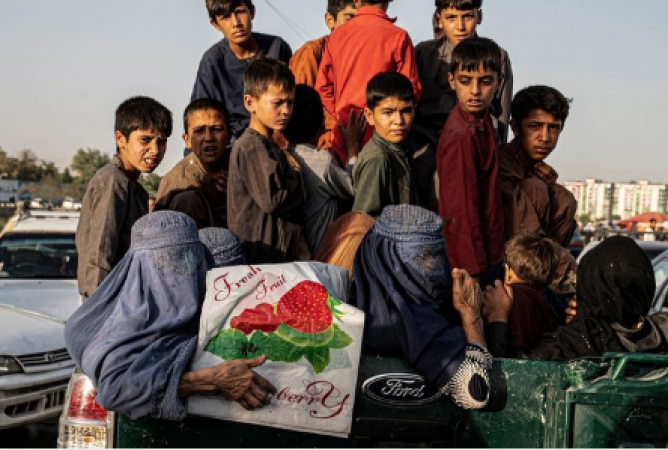
UNO: The United Nations World Food Programme (WFP) has delivered a sobering announcement, revealing that it will be compelled to reduce rations for 2 million Afghan citizens due to dwindling funds. Commencing from March 1, 2023, these cuts will add to the burdens of families already grappling with financial hardships.
The WFP faces a staggering funding shortfall of $220 million to sustain its operations in Afghanistan. This dire predicament is the result of a complex interplay of factors, including the ongoing political turmoil gripping the nation, the withdrawal of international troops, and the enduring shadow of the COVID-19 pandemic.
These reductions will translate into each family receiving just 1,500 calories daily, down from the minimum requirement of 2,100 calories necessary to meet their basic nutritional needs. Furthermore, the consequences will ripple through the WFP's capacity to provide other vital assistance, including shelter, healthcare, and access to education.
Also Read: World Spinal Cord Day 2023: Understanding the Importance
The agency is sounding the alarm, urging donors to step forward with additional funding to avert a looming humanitarian crisis in Afghanistan. The WFP's estimations paint a dire picture, with a staggering 20 million Afghans in dire need of food assistance.
David Beasley, the executive director of the WFP, emphasized the urgency of the situation, stating, "We are facing a race against time to avert a humanitarian catastrophe in Afghanistan. Without urgent funding, we will be forced to make even more cuts to our assistance, which will have devastating consequences for millions of people."
The reduction in food rations is but the latest challenge to afflict Afghanistan, a nation in the throes of a multifaceted crisis. A severe drought has plunged the country into agricultural despair, resulting in crop failures and widespread food scarcities. Meanwhile, the Taliban-led government is grappling with the monumental task of delivering basic services amidst an economic freefall.
The humanitarian landscape in Afghanistan is deteriorating at an alarming pace. Without swift intervention, a catastrophic wave of hunger and malnutrition looms large over millions of vulnerable citizens. The international community faces a critical imperative to unite and provide the essential funding required to stave off this impending humanitarian catastrophe.
Also Read: Controversy in France Over Abaya Ban: Balancing Secularism and Religious Freedom
The Unfolding Crisis: Afghanistan's Precarious Situation
The unfolding humanitarian crisis in Afghanistan is an intricate web of interconnected challenges that threaten the lives and well-being of millions of Afghans.
Funding Shortfall: The heart of the crisis lies in the severe funding shortfall that has left the WFP in dire straits. As international attention wanes and donor fatigue sets in, the agency is struggling to secure the resources needed to provide crucial aid.
Political Turmoil: Afghanistan's ongoing political instability, exacerbated by the withdrawal of international troops and the Taliban's return to power, has created a volatile environment that hampers effective governance and service delivery.
Drought and Crop Failures: A severe drought has decimated agricultural yields, leaving farmers in despair and triggering food shortages. This environmental catastrophe compounds the nation's woes.
Taliban-Led Government Challenges: The new Taliban-led government faces the formidable task of providing basic services, but its efforts are hampered by limited resources, international isolation, and administrative inexperience.
Economic Crisis: Afghanistan's economy is spiraling downward, leaving many without livelihoods and access to essential goods and services.
Urgent Need for International Support
The situation in Afghanistan underscores the urgency of international cooperation and assistance. Swift action is imperative to prevent a full-blown humanitarian catastrophe that could claim countless lives and exacerbate an already precarious situation.
Also Read: India Unveils 2023 ODI World Cup Squad: No Surprises in 15-Member Provisional Team
Donors and governments must heed the WFP's call for additional funding, recognizing the critical role they play in averting disaster. The international community's ability to address this crisis will determine the fate of millions of Afghan citizens, making the provision of vital support an ethical and moral imperative.
In this time of dire need, unity, compassion, and resolute action are paramount. The fate of millions hangs in the balance, and the world's response to Afghanistan's plight will serve as a testament to humanity's ability to alleviate suffering and provide hope in the face of adversity.